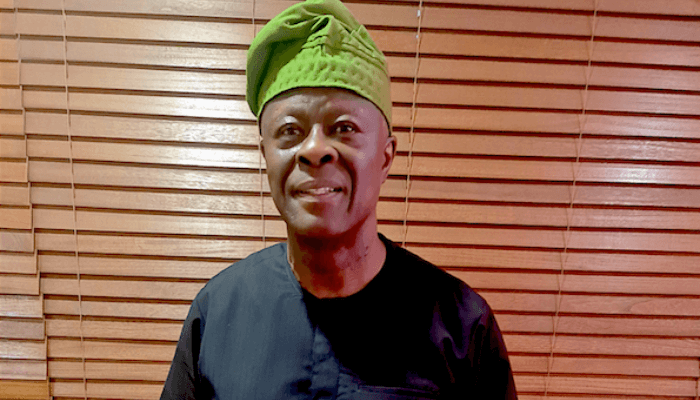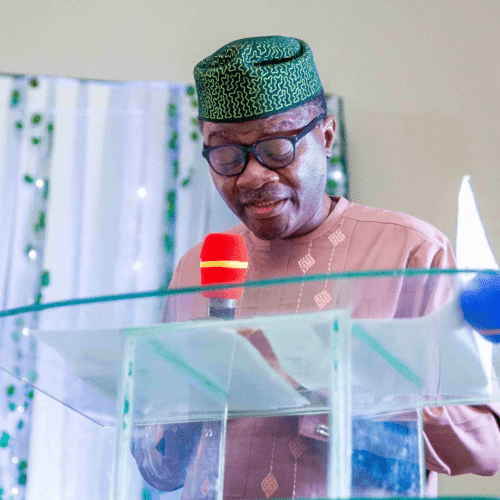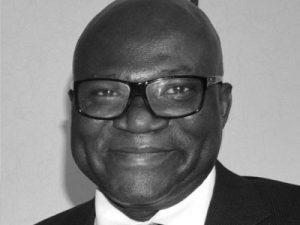President Bola Tinubu yesterday swore in his ministers, the largest cabinet not only among African peers but also of any Nigerian president since 1999, but at least nine of them look destined to carry the weight of the team with their work expected to have an outsized impact on Nigerians.
Tinubu’s ministers, whose portfolios were only confirmed last week, will have a lot on their plates as they officially go to work against the backdrop of rare socio-economic turbulence in Africa’s most populous nation.
There are at least nine members of Tinubu’s team who by the nature of their ministries have less margin for error than most and their performance would determine if Tinubu is able to deliver on his promises to Nigerians to create jobs and reduce poverty.
Among the nine are two coordinating ministers and six ‘average’ ministers, and they include Wale Edun, Ali Pate, Adedayo Adelabu, Doris Anite, David Umahi, Heineken Lokpobiri, Tahir Mamman, Bosun Tijani and Abubakar Kyari.
Edun, the minister of finance and coordinating minister of the economy, easily tops that list, given the financial and macroeconomic challenges facing Nigeria.
An experienced banker, he will be glancing at his wristwatch, hoping the ministerial swearing-in ceremony does not take too much time. Such is the size of the work waiting on his table.
Top of his to-do-list in the coming weeks will be to ensure the petrol subsidy is not allowed to creep back in and work with the Central Bank Nigeria (CBN) to inject the much-needed dollar liquidity into the foreign exchange market in order to stabilise the exchange rate and make the economy attractive for investment.
Nigeria is broke and in urgent need of cash whether it is dollars to grease its illiquid foreign exchange market or naira to invest in human capital and infrastructure. The previous administration tapped debt to fund itself and has catapulted the country’s debt stock to three times the level it was eight years ago. The country’s total debt stock stood at N46 trillion as of March 2023, according to the Debt Management Office.

With the debt stock at just over 35 percent of GDP, the country’s debt appetite looks fine until the cost of the debt on weak revenues is considered.
Nigeria spent 92.6 percent of its revenues repaying creditors last year, according to the International Monetary Fund.
There’s a deep sense of frustration among Nigerians as the past administration’s debt binge did not translate to economic growth or improved standard of living. Last year, the economy grew at about a third of the required rate of about 10 percent, which several economists say is crucial to addressing rising poverty. Tinubu said his administration will target 10 percent growth, and it’s now up to Edun to articulate how that will be achieved.
As coordinating minister of the economy, Edun also faces the additional responsibility of coordinating the economic activities of other ministries and ensuring adequate synergy among departments and agencies of government, a practice introduced in the Olusegun Obasanjo administration.
“Edun will have the difficult task of putting the country’s finances back in order while ensuring the foreign exchange liberalisation policy is not derailed as that would set the country back yet again,” Muda Yusuf, CEO of the Centre for the Promotion of Private Enterprise, told BusinessDay.
“He will need to work to unlock more income from revenue-generating agencies through enhanced efficiency of their operations and also initiate budget reforms to ensure fiscal discipline, curb budget padding, curb duplication of projects and review the service-wide votes to ensure transparency,” Yusuf said.
The second coordinating minister whose work will define Tinubu’s presidency is a professor of public health. Pate was appointed coordinating minister of health and social welfare, and, like Edun, will be required to work with multiple ministries in improving the social welfare of Nigerians.
Pate has his work cut out. Nigeria has one of the weakest healthcare systems in the world, with millions of people lacking access to basic care. He has pledged to make sweeping reforms to the system, and he may have shown the blueprint in a report he co-commissioned that was published by the Lancet Nigeria Commission on ‘Investing in Health and the Future of Nation’.
His ideas range from giving more responsibility to government ministries and agencies to improve health outcomes as well as improving public funding for health with the goal of committing 15 percent of the national budget to health.
Nigeria has neglected its human capital for years with little public investment in health and education. The health sector has attracted some private capital, especially since the COVID-19 pandemic but even more private capital is required to improve access to healthcare in a country where the average life expectancy is only 54 years old, one of the lowest globally.
Education is just as important as health and Nigeria is home to the highest number of out-of-school children in the world. To lead this important ministry is a professor of law, Tahir Mamman.
A record 20 million children did not go to school in Nigeria last year, a stark sign of the government’s lack of investment in education. University teachers routinely down tools in protests against poor pay and facilities and stayed away from classrooms for a record eight months in 2022.
Mamman was the vice chancellor of the Abuja-based private higher institution, Baze University, before his appointment, and all eyes will be on him to see what he’s able to do to turn around education outcomes in Nigeria and perhaps reverse the education tourism that has served as an indictment of the quality of education in Nigeria.
Doris Anite, the minister of industry, trade and investment is the fourth cabinet minister with a key role to play.
Anite is a medical doctor turned finance expert and holds a CFA (Chartered Financial Analysts) charter, specialising in financial risk management and portfolio management.
Her job will include restoring investor confidence in Nigeria’s business environment and dealing with the steady decline in foreign direct investment (FDI) into the country. The country has gone from attracting as much as $2.3 billion in FDI in 2014 to a record low of $155 million in 2022, according to data by the National Bureau of Statistics.
Ghana and some other smaller African countries have stolen a march on Nigeria and are attracting just as much FDI as Africa’s most populous nation despite being only a fraction of the country’s population and economy.
Anite would also need to focus on mobilising domestic capital for investment and working to remove bottlenecks to doing business in growing industries in Nigeria. Her critical role to the economy means she will be working closely with Edun, the coordinating minister of the economy.
Adelabu Adebayo, minister of power, also makes the list of people in key ministries that could define Tinubu’s administration.
Nigeria’s tottering power sector, which has seen electricity generation fall to a new low, now faces an acute cash shortage, which experts say could lead to its imminent collapse and with it a new front of pressure against the government of Tinubu.
Electricity supplied to the national grid is today as low as 3,700 megawatts (MW) and if the export power is excluded, that means Nigerians are receiving less than 3,000MW to their homes and offices, BusinessDay investigation has revealed.
Our investigation showed that the electricity market shortfall has now ballooned to a hefty N90 billion monthly or over N1 trillion a year on account of the massive devaluation of the naira, which has led to an unprecedented surge in the price of gas, a key energy input in Nigeria.
Nigerians who are already hammered by a tripling in petrol prices and a devalued naira with its resulting inflationary pressures now get less electricity, yet they could now be asked to pay as much as 50 percent more to cover for the market shortfall that has now emerged and for their electricity bills to be cost-reflective.
“The key problem for Tinubu and the new minister of power is how do you pass on a higher cost of electricity to consumers that are receiving the lowest amount of energy since privatisation in 2013,” an industry source said.
Bosun Tijani, minister of communications, innovation and digital economy is another one whose work will be particularly decisive.
Tijani’s initial work would be to actualise the President’s ambition of creating one million jobs from ICT.
Tinubu, in his manifesto, made a pledge to create one million digital jobs in the first two years of his administration. With some three months into office, he and Tijani now have less than 20 months to fulfill his pledge.
Tijani, whose wealth of experience within the tech ecosystem and his influence in building some of the tech startups that form the pillars of the Nigerian startup scene endears him to many in the space, would also need to address a number of challenges facing his ministry.
Internet penetration remains below 50 percent despite teledensity hitting over 200 million subscriptions. This means that individuals and businesses continue to grapple with poor-quality internet and speed is not improving with the country’s ranking at 89th. Nigeria is among the countries with the lowest ranking on the global innovation index at 113th.
Tijani will also need to decide what to do with the over 100 million Nigerians with National Identification Numbers collected by the National Identity Management Commission. Harmonising the data and creating a national database can unlock many opportunities for many sectors of the economy. This is where his collaboration skills will be tested as he would need to meet with other data-collecting agencies like the CBN, which keeps the Bank Verification Number; the Nigerian Immigration, which houses the passports; and other agencies that hold custody of different identity forms belonging to Nigerians.
Like his predecessor, Tinubu will head the petroleum ministry while a former senator, Heineken Lokpobiri, is the minister of state for petroleum resources.
Lokpobiri also has his work cut out to reset the oil sector, which has bled investments even as he would attempt to boost the country’s oil production volumes, curb theft and fetch scarce dollars for Nigeria. His work will however largely be directed by Tinubu, himself who is doubling as the minister of petroleum and the senior minister of the two.
Another minister who will be heading a key ministry is Abubakar Kyari, the minister of agriculture and food security.
Kyari is expected to drive Tinubu’s food security plan and lead the charge of revamping the agricultural sector in Africa’s biggest economy in the next four years.
Tinubu recently revealed an immediate, medium and long-term plan to fix the country’s food crisis after declaring a state of emergency on food security.
Kyari’s appointment is coming on the back of the United Nations’ warning of global food shortages due to global warming and climate change effects.
The mainstay of the region’s economy, now devastated by banditry, insecurity, floods, and corruption, among other things has been a priority to the Tinubu-led administration.
The agriculture sector has been a beneficiary of several intervention funds but the sector’s growth has struggled to match the hype.
David Umahi, former governor of the south-eastern state, of Ebonyi, rounds off the list of ministers with more work than most. Umahi, a civil engineer who has been appointed minister of works will have as his key remit addressing part of the gaping infrastructure deficit in Nigeria.
In the eight years of Muhammadu Buhari, for instance, available records show that about N27.82 trillion was budgeted for infrastructure, which represents a small fraction of the $2.3 trillion needed to close the country’s infrastructure deficit.
The administration, according to Babatunde Fashola, the former minister of works, constructed 9,290km of roads nationwide across 35 states and the Federal Capital Territory within this period.
This explains the call by stakeholders for the government to invest more in infrastructure so as to push it from the current 30-35 percent of GDP to 70 percent as recommended for emerging economies in Sub-Saharan Africa.
The completion of the work on the Lagos-Ibadan expressway, one the country’s busiest roads, is one area Nigerians would be keen for Umahi to prioritise.






















